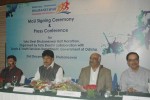Odisha Channel Bureau
Bhubaneswar: The Odisha government has adopted a methodical approach towards ensuring an effective citizen-centric service delivery system to boost productivity and efficiency and has taken up a slew of measures to prepare overarching policies like ICT policy, e-governance roadmap, promotion strategy, information technology (IT) procurement procedure, said Minister of State, Electronics & IT, Tusharkanti Behera.

“We are working to create an ICT-enabling environment to achieve our objectives,” Behera said at a webinar titled, ‘IT Opportunities in Agri and MSME Sector in Odisha’, organised by Odisha Corporate Foundation (OCF), a state-based non-profit organisation, on Sunday.
Encouraging companies to connect with grassroots people, he said, “We are having approximately 6,500 gram panchayats (GPs) having a database of nodal centres which are operating like Jan Seva Kendras. Besides, we have the database of women SGHs working at the block level. Companies can connect with SHGs to expand their businesses. Members of these SHGs are no more making only papad and pickles. Their digital literacy has been enhanced and more and more of them are using smartphones.”
The Minister lamented that many companies are doing great jobs, but they are not connecting to the rural sectors. Giving an example of the pisciculture sector, he said companies and startups are promoting oxygen monitoring in the food industry and disease prevention and setting up sea food processing factories, but they are not involving local people.
“The vision of the government is to involve grassroots people in all sectors – be it agriculture, MSME or others – and ensure that they get the maximum benefit. Hence, it is providing opportunities to those companies which are empowering people at the grassroots level,” he said, urging companies to follow the examples of coaching centres that adopt an aggressive marketing strategy and enroll students by visiting their doorsteps.
He said the state government envisions using IT and IT-enabled services (ITeS) to transform Odisha into an innovation and knowledge-based society focusing on inclusive growth through citizen-based participatory governance.
Chief FinTech Officer, MAS, Govt of Odisha, Sopnendu Mohanty said small and medium enterprises (SMEs) are the backbone of the economy and 50 per cent of the world’s GDP comes from this sector. Globally every country looks at SMEs as their backbone and recovery strategy and the sector creates 80% of jobs globally. “While Micro-SME (MSME) creates the first seed of growth, in this digital world, an MSME can become a big company if it has the right focus and gets suitable opportunities,” he noted.
Urging entrepreneurs of Odisha to focus on digitisation of SMEs to have maximum access to global illiquidity, Mohanty said policy makers of the state should start thinking of a new policy paradigm to consider SME as an opportunity to access capital. Odisha should look to digitise the whole sector as soon as possible, he added.
Co-founder, Ecociate India, Kirti Mishra said with the kind of ecosystem emerging, IT and ITeS are the most critical elements to make the whole system efficient. Encouraging MSMEs and startups to focus on the grassroots to get the maximum benefits, he said: “It is high time we integrated the IT-enabled sector and IT services in agriculture. The emphasis should be on three things – extension, supply chain and marketing where ITeS can be integrated for sustainable growth, may it be agriculture or other sectors.”
Sharing his two decades of experience in IT and ITeS, Regional Head at Standard Chartered Bank Sarat Mohanty said, in the current times availability of finance for MSMEs is not an issue, but accessibility is. He advised entrepreneurs and MSME owners to enroll themselves in the supply chain; think of working capital from the beginning; go digital; and think global if dealing on an export business.
Chief executive officer, Veggie Kart, Gyanendra Acharya said Odisha is the largest per capita consumer of green and leafy vegetables. However, the matter of concern is that a lot of vegetables get wasted during transition. Veggie Kart works for minimising the transition loss and supplies vegetables to consumers at a reasonable price. “So far as the technology part is concerned, it depends on logistics and demand intelligence and partnership with multiple stakeholders. The small-holder farmers are also provided with all necessary support so far as the technology is concerned,” he pointed out.
Co-founder, Luminous Infoways, Jayashree Mohanty welcomed all the speakers. Among others, Founder, eNov8 and Fedobe, Sweden, Joydeep Dash; CEO, Flying Mart, Ashutosh Patra; Managing Director, Tatwa Technologies, Ayashkant Mohanty; and Digital Strategist, BCG Singapore, Manmath Sahoo, also spoke at the webinar.

















